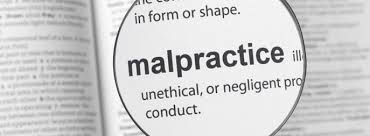
Why Are Legal and Medical Malpractice Cases Hard to Win?
Hopefully you have never been the victim of a legal or medical professional’s mistake. But if you have, you know how difficult it can be to pursue a legal or medical malpractice claim against them. But why is it so difficult to win a malpractice lawsuit?
Medical Malpractice Cases
Winning a medical malpractice lawsuit can be especially difficult for several reasons. First, there are more steps involved for initiating suit. For example, before filing a Complaint, a prospective plaintiff must give written notice to prospective defendants at least 182 days before initiating the lawsuit. When the suit is filed via Complaint, the plaintiff must attach an affidavit of merit which is signed by a qualified healthcare professional and states that in that healthcare professional’s opinion, malpractice existed and it was the cause of the plaintiff’s injuries.
Second, a plaintiff’s fault can reduce or bar a possible medical malpractice award. For example, if the plaintiff alleges a misdiagnosis, but the plaintiff gave false information that led to the misdiagnosis, that could drastically reduce or eliminate any recovery by the plaintiff.
Three, a plaintiff must have an expert witness testify on the plaintiff’s behalf and this expert witness must meet stringent requirements, such as being a licensed healthcare professional in the same field as the defendant and possessing the same board certifications as the defendant.
Legal Malpractice Cases
Legal malpractice cases are also difficult to successfully pursue, but for two different reasons. The first reason is the attorney judgment rule. This rule states that a lawyer cannot be liable for legal malpractice as long as the attorney acted in a good faith belief that her or his actions were in the best interest of her or his client and were based on sound legal principles. In other words, a lawyer is not liable for an understandable error in judgment.
The next reason is probably the biggest hurdle to winning legal malpractices: it essentially requires the plaintiff to win a case-within-a-case. What does that mean exactly? Let’s look at an example:
| John Doe hires an attorney to represent him in a personal injury lawsuit due to injuries he suffered in a car accident. The attorney agrees to represent John Doe and takes the case. However, the attorney files the Complaint after the applicable statute of limitations deadline, so John Doe’s lawsuit is dismissed. John Doe now wants to sue his attorney for legal malpractice.
In order for John Doe to win his legal malpractice lawsuit, he will have to prove that he would have won the underlying personal injury lawsuit as long as the attorney filed the Complaint on time. John Doe cannot say he “could have” won the personal injury lawsuit. Instead, John Does must show he most likely “would have” won the personal injury lawsuit. This is not an easy hurdle to overcome. Basically, John Doe must prove that had the attorney not made a mistake, John Doe would have won the personal injury lawsuit. |
There are other factual and procedural aspects that can make winning or trying a medical or legal malpractice lawsuit difficult. For more information about pursuing or defending a malpractice action, please contact us.




